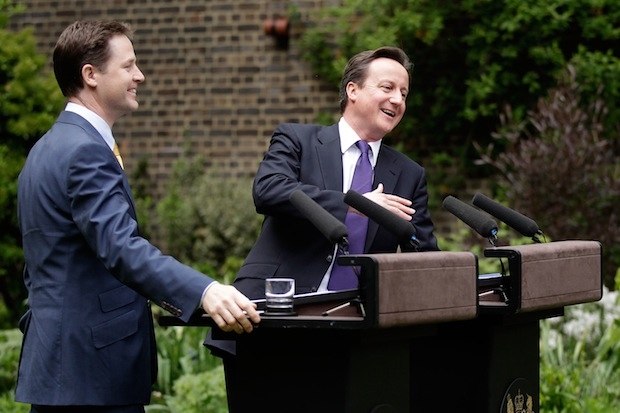That David Cameron is reportedly considering committing to minority government above coalition is a strong message to his backbenchers that he’s not preparing to hop back into bed with Nick Clegg and co in 2015. They have been growing a little feverish about the idea, and ministers have made it known in the party that they would vote against a coalition in any secret ballot on a new deal (provided, of course, that there is a secret ballot).
This is good for party relations in the straightforward sense that Cameron is signalling to his backbenchers that he doesn’t like the Lib Dems as much as they suspect he does, but also because he is to a certain extent signalling that he is prepared to do business with his own MPs, even though that will not be a walk in the park. Minority government nowadays will be difficult because a PM can no longer rely on the unflinching support of his backbenchers. It is cool and respectable to be a rebel, as you are voting for your constituents, rather than your career. This means Cameron would have to do as many deals with his own MPs to get legislation through as he would with other parties. But by signalling that he’s keen to do that deal, Cameron is at least saying he’d rather do deals with the devil he knows.
But this also shows up the Liberal Democrats. The Telegraph reports that the Conservatives have become increasingly frustrated with Nick Clegg’s party as it has moved into full-throttle differentiation. Perhaps it was inevitable that the two parties would bicker more as the years went on, but the Coalition has reached a dreadfully boring stalemate. It is a strange strategy for the Lib Dems, as their strategy all along has been to show voters that coalitions do work and make politics better, and yet the Conservatives seem to be accusing them of making government so boring and fractious that the instability of a minority government looks more appealing.
The question, though, is whether backbench MPs believe these hints from the PM about a desire to go it alone, and whether they are disheartened that he’s even thinking about the chances of the Conservatives not securing a majority. He’s not wrong to do that – many true blue ministers are optimistic about the party’s achievements but pessimistic about the electoral arithmetic in 2015. But there are enough malcontents in the party who will try to see it quite differently, especially those who are licking their lips at the thought of trouble after May’s European elections.
P.S. Naturally, No10 is pouring cold water on this (while not explicitly denying it), saying: ‘We’re going all out for victory – you won’t find the PM saying anything else. Our manifesto is about policy. Between now and the election we’re not going to talk about any outcome other than victory.’







Comments